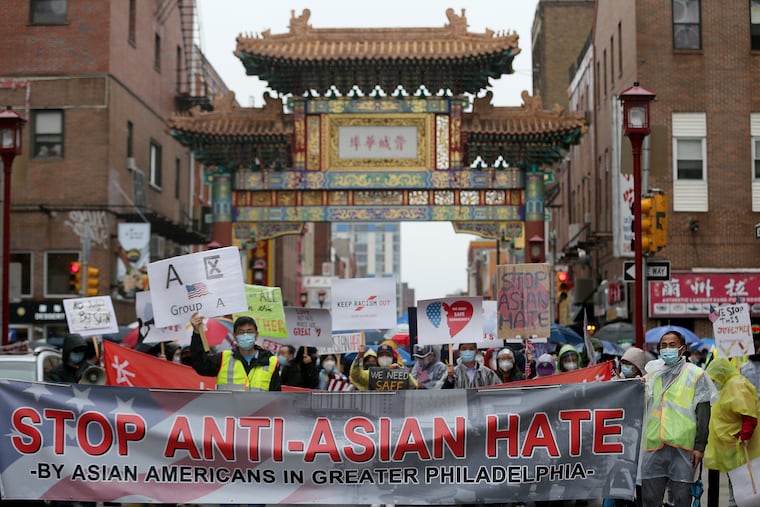Police investigating Chinatown assault that some Asian American community leaders say adds to ‘climate of fear’
While the motivation is unclear, the assault in the city’s most prominent Asian American enclave is yet another distressing incident for some Philadelphians amid a wave of anti-Asian hate nationally.

A 27-year-old woman of Asian descent was hospitalized Sunday afternoon after a man walked up to her on a Chinatown sidewalk, hit her in the face, and walked away.
The incident was caught on surveillance cameras, and Philadelphia police said they arrested the man shortly after the attack. Officials said the 30-year-old suspect, who faces assault charges, is experiencing homelessness, and mental illness was likely a factor. The victim was transported from the 100 block of North 11th Street to Jefferson University Hospital, where she is listed in stable condition, police said.
While the motivation is unclear, the assault in the city’s most prominent Asian American enclave is yet another distressing incident for some Philadelphians — especially those of east and Southeast Asian descent — amid a wave of anti-Asian hate incidents nationally.
“Community members have always seen Chinatown as a safe haven,” said Anna Perng, founder of the Chinatown Disability Advocacy Project. “And so for an incident to happen right on the edge sends a lot of renewed anxiety through the community.”
Across the country, Asian Americans have reported increasing levels of verbal harassment, random attacks, and violence, in some cases spurred by racist views and the coronavirus pandemic. Two elderly Asian American men were killed in California this year; a man went on a shooting rampage at Asian-owned business in Atlanta last month; and last week, a man kicked and stomped on a 65-year-old Filipino immigrant in New York City.
In Philadelphia, reports of anti-Asian American hate incidents tripled between 2019 and 2020, leaving some of the city’s 120,000 Asian American residents worried they could be targeted.
» READ MORE: Philly Asian Americans have experienced a year of hateful acts, and fear it’s going to get even worse
Whether or not the victim Sunday was targeted specifically for her race, the incident still adds to “a climate of fear,” said Rob Buscher, president of the Philadelphia chapter of the Japanese American Citizens League.
“All of society is itching to get back to business as usual and feeling optimistic about vaccine distribution,” he said, “and I think a lot of Asian Americans are feeling some kind of reluctance or apprehension about what it means to go back to normal if that means putting themselves in harm’s way simply by walking down the street.”
Last summer, controversy erupted after a homeless woman with mental health complications punched an Asian American woman who was eight months pregnant in Center City. The victim wanted the case to be prosecuted as a hate crime, but District Attorney Larry Krasner said the defendant’s background suggested mental health court was the proper venue.
Perng said the incident Sunday necessitates a broader conversation about how the city serves people experiencing homelessness, or those in a mental health crisis, including the accessibility of treatment.
“Chinatown isn’t only the residents. It also includes the folks who live in the shelters and folks who receive treatment at mental health programs in the area,” she said. “Some of the folks we see clearly don’t fit into the existing program options. How do we better support them?”
Inquirer staff writers Erin McCarthy and Jacob Adelman contributed reporting.